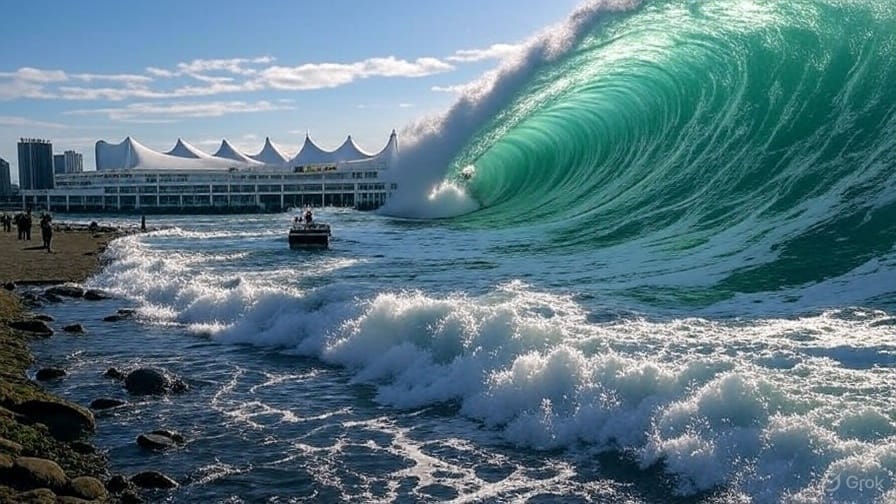
By Elke Porter | WBN News Vancouver | May 22, 2025
Subscription to WBN and being a Contributor is FREE!
Vancouver Island, Canada, is experiencing ongoing seismic shifting beneath its surface, raising awareness among residents and authorities about the region’s vulnerability to earthquakes. According to Earthquake Track, which monitors seismic activity, Vancouver Island has recorded 69 earthquakes of magnitude 1.5 or greater over the past year as of May 22, 2025.
Small Hints of a Big One Coming!
While there have been no quakes in the last 24 hours at 09:37 PM PDT, the region saw one earthquake in the past week, four in the past month, and a significant 6.4-magnitude event in Tofino, British Columbia, earlier this year. The most recent quake this week was a 1.7-magnitude tremor in Forks, Washington, while this month’s largest was a 3.0-magnitude event in Ucluelet, British Columbia.
Visit EarthQuakeTrack,com
For the latest updates, residents can visit the Earthquake Track website at earthquaketrack.com under "Recent Earthquakes Near Vancouver Island, Canada." Greater Vancouver, at just 9 meters (29.53 feet) above sea level, faces heightened risks from potential tsunamis triggered by seismic activity along the Cascadia Subduction Zone.
A massive tsunami could inundate low-lying areas like Richmond and Vancouver Island, leaving Vancouver exposed. Heavy rainfall can exacerbate flooding, while blackouts or cyberattacks could compound challenges during a natural disaster. During an earthquake, some of the safest places in Vancouver to seek shelter are open, elevated areas away from buildings, trees, and power lines.
Three Places You want to Be During an Earthquake
Queen Elizabeth Park, at 125 meters above sea level, offers a high, open space with minimal risk of falling debris. Stanley Park, with its open fields like Brockton Oval, provides a safe spot away from structures, though avoid areas near tall trees. Pacific Spirit Regional Park, with its wide trails and open spaces, is another secure location, situated on higher ground and away from urban hazards.
Three Places You Don't Want to Be During an Earthquake
- Diamond Centre Parking Lot: The unique spiral design of this parking structure could amplify seismic forces, increasing the risk of structural failure or difficulty evacuating due to its tight, curving layout. Multi-story parking garages are prone to collapse in strong earthquakes, and navigating a spiral ramp during shaking would be hazardous.
- Any Bridge Over Water (e.g., Lions Gate Bridge or Burrard Street Bridge): Bridges spanning bodies of water, like those connecting to the ocean or Burrard Inlet, are vulnerable during earthquakes. A collapse could leave you stranded or at risk of falling into the water, with additional dangers from aftershocks or tsunamis, which are a concern in Vancouver due to its coastal location.
- Tall Highrise Above the 9th Floor: Being in a highrise above the 9th floor, especially in older buildings not retrofitted for modern seismic standards, poses risks due to intense swaying and potential structural damage. Fire engine ladders typically can’t reach beyond 7-10 stories, complicating rescue efforts, and elevators may become inoperable, trapping occupants.
Emergency Kit
Emergency preparedness is critical. An emergency kit should include a week’s supply of non-perishable food, four litres of water per person per day, a first-aid kit, flashlights, batteries, a manual can opener, blankets, waterproof clothing, life jackets, and waterproof bags. A battery-powered radio ensures updates during outages, and cash is essential as ATMs may fail.
Secure heavy objects, learn to shut off utilities, and download the Alertable app for alerts. Evacuation routes to higher ground—above 20 meters—are vital for tsunamis. Also, create a family emergency plan and agree on a meeting place, such as your local community center or school.
The Ministry of Emergency Management and Climate Readiness operates EmergencyInfoBC, providing 24/7 updates at EmergencyInfoBC.ca.
Follow@EmergencyInfoBCon X for alerts, and contact your local authority for plans. Community resilience is key—connect with neighbors and stay proactive by monitoring Earthquake Track and local updates to navigate Vancouver’s seismic risks.
#Vancouver Earthquake #Seismic Safety #Emergency Prep #Tsunami Risk #Earthquake Track #Community Resilience #WBN News Vancouver #Elke Porter
Connect with Elke at Westcoast German Media or on LinkedIn: Elke Porter or contact her on WhatsApp: +1 604 828 8788


